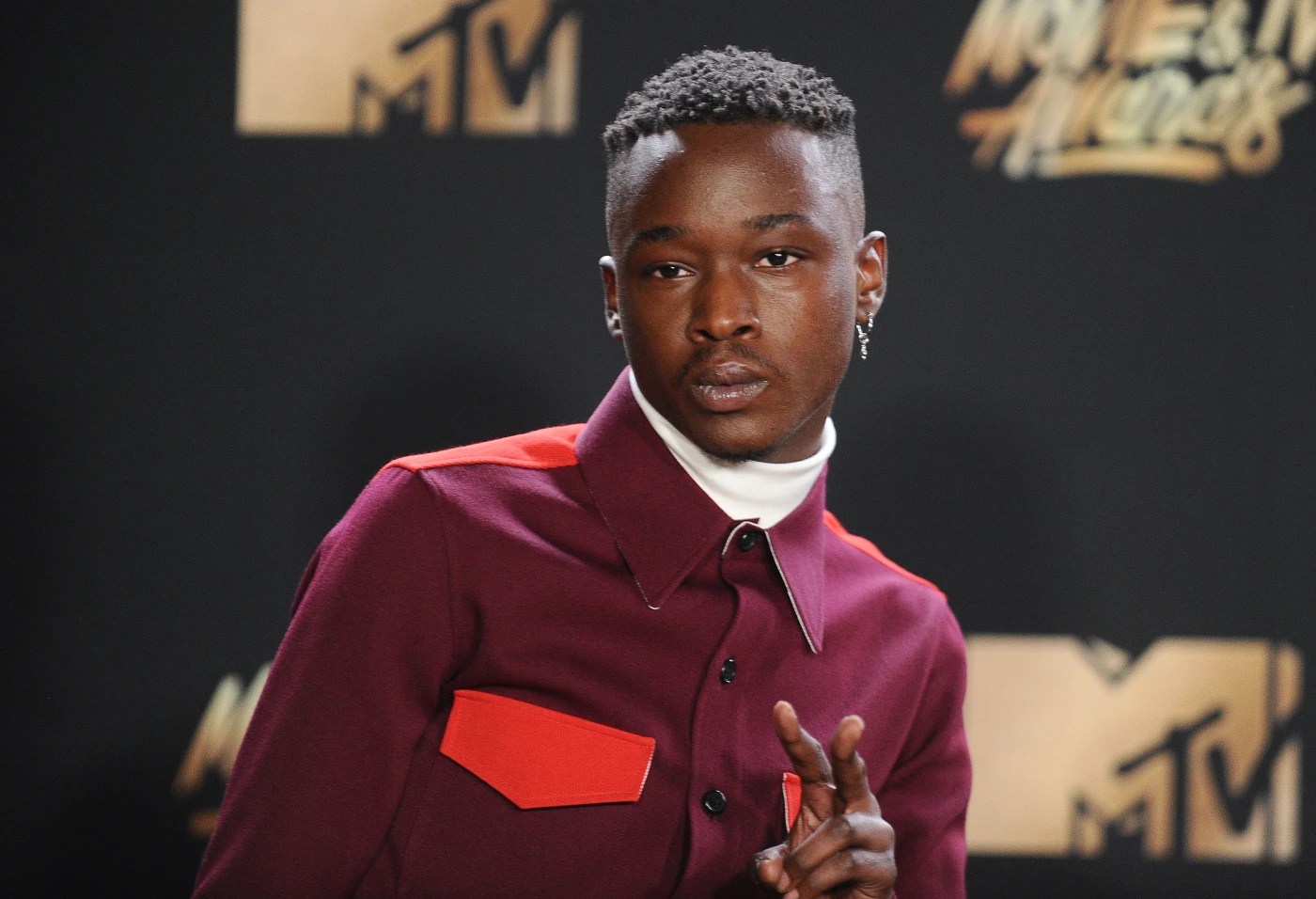Ashton Sanders' sexuality refers to his sexual orientation and preferences. Public figures' sexuality, including those of actors like Sanders, is a topic of interest to media and the general public.
The significance of discussing and understanding public figures' sexuality lies in its potential to raise awareness, foster inclusivity, and challenge societal norms and stereotypes surrounding sexual orientation. Openly identifying with a particular sexual orientation can inspire others to do the same, contributing to a more diverse and accepting society.
In Ashton Sanders' case, his sexuality has been a subject of public discussion and speculation, with some sources suggesting he is gay or bisexual. However, Sanders himself has not publicly confirmed or denied these speculations, and it is ultimately up to him to disclose his sexual orientation on his own terms.
Ashton Sanders' Sexuality
Ashton Sanders' sexuality, referring to his sexual orientation and preferences, has been a subject of public interest and speculation. While Sanders himself has not publicly confirmed or denied his sexual orientation, discussions surrounding his sexuality highlight the importance of inclusivity, diversity, and challenging societal norms.
- Privacy: Individuals have the right to privacy regarding their sexual orientation.
- Representation: Openly identifying with a particular sexual orientation can inspire others and contribute to a more diverse and accepting society.
- Speculation: Public figures' sexuality is often subject to speculation and rumors, which can be intrusive and disrespectful.
- Stereotypes: Discussions about public figures' sexuality can challenge stereotypes and promote understanding.
- Coming Out: Coming out as LGBTQ+ can be a challenging but empowering experience.
- Allyship: Supporting LGBTQ+ individuals, regardless of one's own sexual orientation, is crucial for creating an inclusive society.
- Intersectionality: Sexual orientation intersects with other aspects of identity, such as race, gender, and class.
- Mental Health: LGBTQ+ individuals face unique mental health challenges, including those related to societal stigma.
- Activism: Many LGBTQ+ individuals are actively involved in advocating for their rights and visibility.
These aspects collectively underscore the significance of respecting individuals' privacy, promoting inclusivity, and challenging societal norms surrounding sexual orientation. Ashton Sanders' sexuality, whether publicly confirmed or not, contributes to the broader discourse on these important issues.
| Name | Born | Occupation |
|---|---|---|
| Ashton Sanders | October 24, 1995 | Actor |
Privacy
Ashton Sanders' sexuality is a personal matter, and he has the right to privacy regarding his sexual orientation. Discussing public figures' sexuality without their consent can be intrusive and disrespectful, and it is crucial to respect their boundaries.
- Autonomy: Individuals should have the autonomy to make decisions about their own lives, including their sexual orientation.
- Consent: It is unethical to discuss someone's sexual orientation without their consent, as it violates their privacy.
- Stigma: Publicly discussing someone's sexual orientation can reinforce stigma and discrimination against LGBTQ+ individuals.
- Safety: In some cases, publicly discussing someone's sexual orientation can put them at risk of violence or discrimination.
Respecting Ashton Sanders' privacy regarding his sexual orientation aligns with the broader principle of respecting individuals' autonomy and privacy. It is important to remember that public figures are entitled to the same privacy rights as everyone else.
Representation
Ashton Sanders' sexuality, whether publicly confirmed or not, contributes to the broader discourse on the importance of representation and visibility for LGBTQ+ individuals. When public figures openly identify with a particular sexual orientation, it can inspire others to do the same, contributing to a more diverse and accepting society.
- Role models: Public figures who openly identify as LGBTQ+ can serve as role models for others, providing visibility and inspiration.
- Normalization: Openly identifying with a particular sexual orientation can help normalize LGBTQ+ identities and challenge societal stigma.
- Increased acceptance: Visibility and representation can lead to increased acceptance and understanding of LGBTQ+ individuals.
- Diversity: Openly identifying with a particular sexual orientation contributes to a more diverse and inclusive society, where individuals from all walks of life are valued and respected.
Ashton Sanders' sexuality, in the context of representation, highlights the importance of visibility, acceptance, and diversity for LGBTQ+ individuals. By openly identifying with a particular sexual orientation, public figures can contribute to a more inclusive and accepting society where everyone feels valued and respected.
Speculation
Public figures, including actors like Ashton Sanders, often have their sexuality subjected to speculation and rumors. This can be intrusive and disrespectful, as it violates their privacy and reinforces the idea that their sexual orientation is a matter of public interest or debate.
In Ashton Sanders' case, the speculation surrounding his sexuality has been ongoing for several years, with some sources suggesting he is gay or bisexual. However, Sanders himself has not publicly confirmed or denied these speculations, leading to continued media and public interest in his sexual orientation.
The speculation surrounding Ashton Sanders' sexuality highlights the challenges faced by many public figures who choose to keep their sexual orientation private. They may face pressure to come out publicly, even if they are not ready or comfortable doing so. This can lead to feelings of anxiety, stress, and even fear for their safety or career.
It is important to remember that public figures are entitled to the same privacy rights as everyone else. Their sexual orientation is a personal matter, and it is up to them to decide when and how they want to share it with the public. Speculating about or gossiping about their sexuality is not only disrespectful but also harmful, as it can reinforce the stigma and discrimination faced by LGBTQ+ individuals.
Stereotypes
Discussions about public figures' sexuality can challenge stereotypes and promote understanding by providing visible examples of individuals who defy societal norms and expectations. When public figures openly identify with a particular sexual orientation, it can help to normalize LGBTQ+ identities and challenge the idea that there is only one "normal" way to be. This can be especially important for young people who are struggling with their own sexual orientation or gender identity, as it can provide them with role models and a sense of community.
In the case of Ashton Sanders, his sexuality, whether publicly confirmed or not, contributes to the broader discourse on the importance of challenging stereotypes and promoting understanding of LGBTQ+ individuals. By living openly and authentically, public figures like Sanders can help to break down barriers and create a more inclusive society.
It is important to remember that stereotypes are harmful and inaccurate generalizations. They can lead to discrimination and prejudice against individuals who do not conform to societal expectations. By challenging stereotypes and promoting understanding, we can create a more just and equitable society for all.
Coming Out
Coming out as LGBTQ+ can be a deeply personal and challenging experience, but it can also be an incredibly empowering one. For public figures like Ashton Sanders, coming out can have a significant impact on their careers and personal lives.
- The Importance of Visibility: Coming out can help to increase visibility and representation for LGBTQ+ individuals, challenging stereotypes and promoting understanding.
- Personal Growth: Coming out can be a catalyst for personal growth and self-acceptance, allowing individuals to live more authentically.
- Community Building: Coming out can help to connect individuals with other LGBTQ+ people, fostering a sense of community and belonging.
- Activism and Advocacy: Coming out can be a powerful form of activism and advocacy, helping to raise awareness and fight for LGBTQ+ rights.
Ashton Sanders' sexuality, whether publicly confirmed or not, contributes to the broader conversation about the importance of coming out. By living openly and authentically, public figures like Sanders can help to create a more inclusive and accepting society for all LGBTQ+ individuals.
Allyship
In the context of "Ashton Sanders Sexuality," allyship plays a critical role in fostering an inclusive environment where LGBTQ+ individuals feel valued and respected. Allyship involves actively supporting and advocating for LGBTQ+ rights, regardless of one's own sexual orientation.
- Visibility and Representation: Allies can help increase visibility and representation for LGBTQ+ individuals by speaking out against discrimination, attending Pride events, and supporting LGBTQ+ organizations.
- Education and Awareness: Allies can educate themselves and others about LGBTQ+ issues, challenging stereotypes and promoting understanding.
- Political Advocacy: Allies can support LGBTQ+ rights through political advocacy, such as contacting elected officials and voting for candidates who support LGBTQ+ equality.
- Creating Safe Spaces: Allies can create safe and welcoming spaces for LGBTQ+ individuals, both online and offline, where they can feel comfortable being themselves.
By embracing allyship, individuals can contribute to a more inclusive society where Ashton Sanders and other LGBTQ+ individuals can live openly and authentically without fear of discrimination or prejudice.
Intersectionality
Ashton Sanders' sexuality is not defined solely by his sexual orientation but is also shaped by his experiences as a Black man in America. Intersectionality, a framework for understanding how different forms of oppression and discrimination overlap, provides a lens through which to examine the unique challenges faced by LGBTQ+ people of color.
For example, Black LGBTQ+ individuals may face discrimination based on both their sexual orientation and their race. They may experience prejudice and violence from both the LGBTQ+ community and the Black community. Additionally, Black LGBTQ+ people are more likely to live in poverty and experience unemployment and homelessness than their White LGBTQ+ counterparts.
Understanding the intersectionality of Ashton Sanders' sexuality is crucial for creating a truly inclusive society. It is not enough to simply tolerate LGBTQ+ people; we must also actively work to address the unique challenges they face. This means creating safe and welcoming spaces for LGBTQ+ people of color, advocating for policies that protect their rights, and working to dismantle the systems of oppression that perpetuate discrimination.
Mental Health
The societal stigma surrounding LGBTQ+ individuals can have a significant impact on their mental health. LGBTQ+ individuals are more likely to experience anxiety, depression, and suicidal thoughts than heterosexual and cisgender individuals. This is due in part to the discrimination and prejudice that LGBTQ+ individuals often face, which can lead to feelings of isolation, shame, and low self-esteem.
Ashton Sanders, as a public figure who is open about his sexuality, may face unique mental health challenges related to his sexual orientation. He may experience negative comments or harassment from the public, which could contribute to feelings of stress, anxiety, or depression. Additionally, Sanders may feel pressure to conform to societal expectations and hide his true self, which could lead to internalized homophobia and further mental health challenges.
Understanding the mental health challenges faced by LGBTQ+ individuals is crucial for creating a more inclusive and supportive society. It is important to challenge the stigma surrounding LGBTQ+ individuals and to create safe and affirming spaces where they can feel comfortable being themselves. Additionally, it is important to provide LGBTQ+ individuals with access to mental health services that are sensitive to their unique needs.
Activism
Ashton Sanders' sexuality, whether publicly confirmed or not, contributes to the broader discourse on the importance of activism within the LGBTQ+ community. Many LGBTQ+ individuals are actively involved in advocating for their rights and visibility, working to create a more just and equitable society.
- Visibility and Representation: LGBTQ+ activists work to increase the visibility and representation of LGBTQ+ individuals in all aspects of society, from the media to the workplace. This helps to challenge stereotypes and promote understanding, making it easier for LGBTQ+ individuals to live openly and authentically.
- Political Advocacy: LGBTQ+ activists advocate for policies that protect the rights of LGBTQ+ individuals, such as anti-discrimination laws and marriage equality. They work to elect LGBTQ+ candidates to office and to influence public opinion on LGBTQ+ issues.
- Community Building: LGBTQ+ activists work to build strong and supportive communities for LGBTQ+ individuals. They create safe spaces where LGBTQ+ people can socialize, connect, and access resources. They also work to provide support and assistance to LGBTQ+ individuals who are facing discrimination or violence.
- Education and Awareness: LGBTQ+ activists work to educate the public about LGBTQ+ issues and to challenge stereotypes and prejudice. They provide educational programs, speak out against discrimination, and work to create a more inclusive and understanding society.
Ashton Sanders' activism, whether through his own personal experiences or through his support of LGBTQ+ organizations, contributes to the collective efforts of the LGBTQ+ community to advocate for their rights and visibility. By living openly and authentically, and by using his platform to speak out against discrimination and prejudice, Sanders helps to create a more just and equitable society for all LGBTQ+ individuals.
FAQs about Ashton Sanders' Sexuality
This section answers frequently asked questions about Ashton Sanders' sexuality, providing factual information and addressing common concerns or misconceptions.
Question 1: Is Ashton Sanders gay?
Ashton Sanders has not publicly confirmed or denied his sexual orientation. Speculating about someone's sexual orientation without their consent is intrusive and disrespectful.
Question 2: Why is Ashton Sanders' sexuality a topic of public interest?
Public figures' sexuality often garners attention due to societal fascination with their personal lives. However, it is crucial to respect their privacy and allow them to disclose their sexual orientation on their own terms.
Question 3: What is the significance of discussing Ashton Sanders' sexuality?
Discussing public figures' sexuality can raise awareness, foster inclusivity, and challenge societal norms surrounding sexual orientation. It can inspire others to be open about their own identities and contribute to a more diverse and accepting society.
Question 4: What are the potential implications of Ashton Sanders coming out publicly?
Coming out can be a deeply personal and challenging experience. For public figures, it can impact their careers and personal lives. However, it can also be an empowering act that increases visibility and representation for LGBTQ+ individuals.
Question 5: How can we support Ashton Sanders and other LGBTQ+ individuals?
Supporting LGBTQ+ individuals involves creating inclusive environments, challenging stereotypes, and advocating for their rights. Allyship is crucial in fostering a society where everyone feels valued and respected.
Question 6: What are some resources for learning more about LGBTQ+ issues and allyship?
Numerous organizations and resources provide information and support on LGBTQ+ issues and allyship. These resources can help individuals educate themselves and become more informed advocates for equality.
Summary: Ashton Sanders' sexuality is a personal matter that he has not publicly confirmed or denied. It is important to respect his privacy and to focus on creating an inclusive society where all individuals feel valued and supported, regardless of their sexual orientation.
Transition: These FAQs provide a brief overview of common questions and concerns regarding Ashton Sanders' sexuality. For further information and support, please refer to the resources listed below.
Tips Regarding Ashton Sanders' Sexuality
The topic of Ashton Sanders' sexuality has generated considerable interest and discussion. Here are some important tips to consider when engaging in conversations or forming opinions about public figures' sexual orientations:
Tip 1: Respect Privacy: Understand that sexual orientation is a deeply personal matter, and individuals have the right to privacy. Avoid speculating or gossiping about someone's sexual orientation without their consent.
Tip 2: Challenge Stereotypes: Be mindful of the stereotypes and assumptions often associated with sexual orientation. Challenge these stereotypes and promote a more inclusive and understanding society.
Tip 3: Support Inclusivity: Create inclusive environments where individuals feel comfortable and respected regardless of their sexual orientation. Support organizations and initiatives that advocate for LGBTQ+ rights.
Tip 4: Educate Yourself: Educate yourself about LGBTQ+ issues, terminology, and the challenges faced by LGBTQ+ individuals. This will help you engage in informed and respectful conversations.
Tip 5: Be an Ally: Stand up against discrimination and prejudice based on sexual orientation. Support LGBTQ+ individuals and organizations, and speak out against hate speech and violence.
Tip 6: Use Respectful Language: Always use respectful and inclusive language when discussing sexual orientation. Avoid using derogatory or outdated terms, and be mindful of the impact your words may have on others.
Tip 7: Listen Actively: When engaging in conversations about sexual orientation, listen actively to the perspectives and experiences of LGBTQ+ individuals. Seek to understand their experiences and challenges.
Tip 8: Respect Boundaries: Understand that not everyone is comfortable discussing their sexual orientation. Respect the boundaries of others and avoid pressuring them to disclose personal information.
By following these tips, we can foster a more inclusive and respectful society where individuals are valued and supported, regardless of their sexual orientation.
Summary: Respecting privacy, challenging stereotypes, supporting inclusivity, educating oneself, being an ally, using respectful language, listening actively, and respecting boundaries are crucial for engaging in constructive conversations about Ashton Sanders' sexuality and LGBTQ+ issues in general.
Conclusion
Ashton Sanders' sexuality, while a personal matter, has sparked important conversations about privacy, representation, and the challenges faced by LGBTQ+ individuals. Respecting individuals' privacy and creating inclusive environments are paramount for fostering a society where everyone feels valued and supported.
The broader discourse surrounding Ashton Sanders' sexuality highlights the need to challenge stereotypes, promote understanding, and advocate for LGBTQ+ rights. By embracing allyship, educating ourselves, and using respectful language, we can contribute to a more inclusive and just society.
Unveiling Shay Mitchell's Net Worth: Unveiling Success
Unveiling The Deceptive World Of Fake Polkadot: Insights And Discoveries
Unveiling Brian Cushing's Age: Unlocking Secrets And Inspiring Insights

Is Ashton Sanders Gay? Know His Sexuality & Personal Life Oli And Alex

Is Ashton Sanders Gay? The 'Moonlight' Actor Is Straight but Rarely

Is Ashton Sanders Gay? Looking Deeper Into His Sexuality
ncG1vNJzZmiemJ57tH%2BNrqpmr5WowW5%2BjZqkmrKfo664v42cpqZnkai1tbvNZqqappSav7R50p6vrpmcnsG6esetpKU%3D